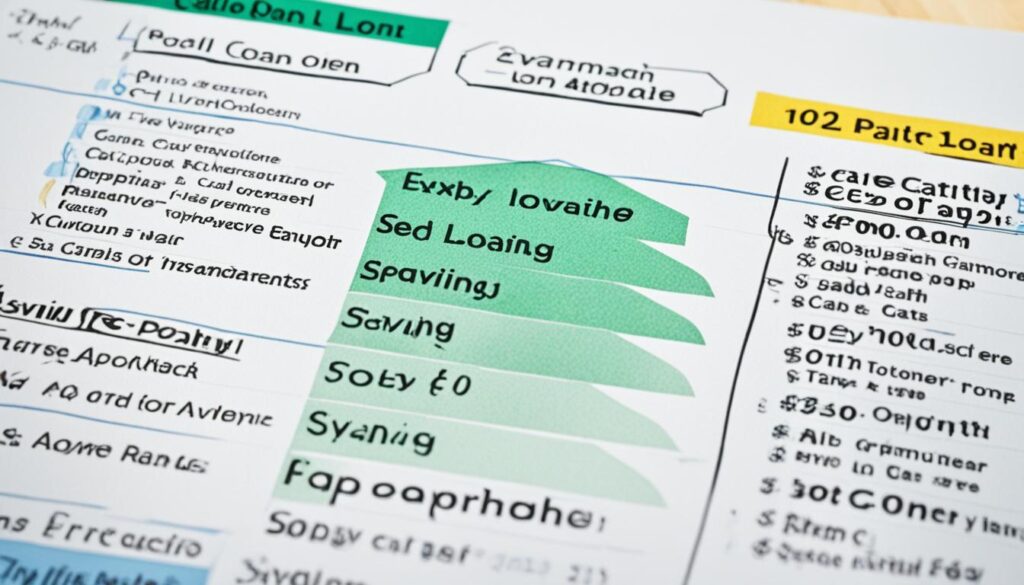Did you know that Americans currently owe a staggering $1.18 trillion on auto loans, with an average of $32,187 for new cars? This overwhelming figure highlights a prevalent challenge that many face today: deciding between car loan repayment vs. saving for a home, the question that looms large in today’s complex financial landscape.
As individuals navigate their financial journeys, thoughtful budget management becomes essential to ensure that priorities align with long-term financial goals. With recent statistics showing that only 44% of Americans could cover an unexpected expense of $1,000 from their savings, the need for a strategic approach is evident1. This article will delve deep into the financial comparison of these two options, aiming to offer clear insights that will empower informed decision-making for optimal financial health.
Key Takeaways
- Understanding personal financial health is crucial in determining whether to prioritize a car loan repayment or saving for a home.
- The average interest rate for a new car loan stands at approximately 5.7%, impacting repayment decisions2.
- Long-term savings for a home can lead to equity building, whereas car loans typically involve ongoing monthly payments.
- Emergency savings play a significant role, with only 36% of individuals saying their credit card debt exceeds their emergency funds1.
- Strategic budgeting allows individuals to effectively manage debt while planning for future investments, such as real estate.
Understanding the Current Financial Landscape
The financial landscape can be complex, especially when weighing the options of car loan repayment vs. saving for a home. Current statistics indicate that the average monthly payment on a new car in the first quarter of 2024 was $735, which reflects ongoing trends in auto financing and ownership costs3. The average price of a new car has escalated to $46,085 as of February 2022, marking an increase of 11.4% from the previous year4. Such pricing dynamics not only influence the feasibility of car ownership but also intersect significantly with housing market trends.
Statistics on Car Loans and Home Savings
As of now, nearly 79% of Americans possess a credit card, with 44% having a mortgage5. The enduring challenge for many is maintaining a healthy debt-to-income ratio, which is pivotal for future borrowing capabilities. High interest rates on car loans, particularly for individuals with poor credit, can average around 14.39%4. This can lead to higher monthly payments, which can divert funds away from saving for a home. In fact, the average auto loan term tends to be approximately 70 months, with many borrowers opting for longer terms4.
| Statistic | Value |
|---|---|
| Average monthly payment on a new car (2024) | $735 |
| Average price of a new car (February 2022) | $46,085 |
| Percentage of Americans with a credit card | 79% |
| Percentage of consumers with a mortgage | 44% |
| Average interest rate on car loans (bad credit) | 14.39% |
The Importance of Building Savings
Building savings plays a crucial role in financial health. Reports show that only 44% of Americans are equipped with sufficient savings to handle unforeseen expenses5. Establishing a robust savings foundation allows individuals to mitigate reliance on credit, especially during economic fluctuations influenced by interest rate changes. Having liquid assets can protect against market volatility causing unexpected increases in loan payments, thus reinforcing the value of saving for a home while navigating car loan repayment responsibilities. 
The Case for Car Loan Repayment vs. Saving for a Home
When considering the financial implications of paying off a car loan versus saving for a home, analyzing the loan interest rates and associated long-term costs is crucial. The interest rate on a car loan is typically higher than that for a mortgage, leading to significant financial comparisons for prospective homeowners and car owners alike6. Currently, the average interest rate for new car loans stands at about 5.7%, which can considerably affect the monthly repayment amount and the total cost when factoring in the duration of the loan6.

In terms of debt-to-income ratio considerations, it’s vital to understand how your existing debts could influence your eligibility for a mortgage. A high debt-to-income ratio could hinder the ability to secure favorable mortgage options7. With around $16,000 remaining on a car loan, one must evaluate whether to utilize this amount for a home down payment or allocate it towards paying off the vehicle, as the outcomes will vary based on financial strategy and individual financial health6.
Interest Rates and Long-Term Costs
Interest rates play a substantial role in determining long-term expenses. For instance, a typical car loan might last up to 5 years, while mortgage loans have a 30-year term, leading to different overall costs depending on how interest accumulates over time6. By paying off the car loan earlier, one might save thousands in interest, allowing for more resources to be allocated toward a home purchase in the future8. Considering these factors is essential for making a savvy financial decision.
Debt-to-Income Ratio Considerations
Aiming for a lower debt-to-income ratio can enhance your creditworthiness and enable you to take on additional debt when you’re ready to buy a home. Refinancing options can help lower car loan payments, thus improving your DTI ratio7. For potential homebuyers, analyzing the impact of existing auto loans on your financial situation is key, as having a lower DTI often translates to better mortgage rates and conditions8.
Benefits of Prioritizing Home Savings
Prioritizing a home saving plan offers multiple advantages, especially when it comes to real estate investment. Investing in property often enables individuals to cultivate their financial futures through equity building. Homeownership has historically been a reliable path to accumulating wealth, with properties typically appreciating over time. Not only does this create a long-term asset, but it also provides stability when compared to renting.
Real Estate as an Investment
Real estate represents a significant opportunity for growth. Owning a home allows for the potential of increased value, which can be particularly beneficial during favorable market conditions. As homeowners often see the value of their property increase, this can serve as a cornerstone in a long-term investment strategy. By prioritizing home savings, individuals can create a solid financial foundation, further empowering their wealth-building efforts.
Homeownership and Equity Building
In addition to potential appreciation, homeownership plays a crucial role in equity building. When homeowners make mortgage payments, they steadily increase their equity, which is an essential aspect of financial growth. Studies suggest that paying down a mortgage early can save substantial amounts in interest over the life of the loan. By making extra payments early on, individuals can significantly reduce their total interest costs and build more equity, thereby enhancing their overall financial well-being9. This process becomes increasingly advantageous when paired with the tax benefits associated with mortgage interest deductions, allowing homeowners to maximize their investment returns10.
| Strategy | Expected Benefit |
|---|---|
| Make Extra Payments | Save significantly on interest costs over the life of the loan |
| Claim Tax Deductions | Reduce taxable income and increase cash flow |
| Invest in Property Early | Build equity rapidly through market appreciation |
| Create a Home Savings Plan | Establish a robust financial foundation for the future |
Car Loan Repayment vs. Saving for a Home
Balancing immediate financial relief from car loan repayment against long-term goals of building home equity requires careful consideration. Focus on current debt can relieve monthly pressures, yet may delay substantial future investments, especially for potential homeowners.
Weighing Immediate vs. Long-Term Financial Goals
Short-term strategies may provide necessary financial breathing room, but the bigger picture of future homeownership should not be overlooked. Prospective homebuyers need robust down payment strategies to secure favorable mortgage terms.
Down Payment Strategies for Homebuyers
Experts suggest saving at least 20% of the home’s purchase price to evade private mortgage insurance (PMI), which can be an unwelcome additional expense. An auto loan calculator can assist in budgeting this amount effectively, facilitating better decisions in overall budget management. For instance, if a home costs $300,000, saving $60,000 for the down payment can significantly enhance financial stability.
| Home Price | 20% Down Payment | Monthly Savings Needed (12 months) |
|---|---|---|
| $200,000 | $40,000 | $3,334 |
| $300,000 | $60,000 | $5,000 |
| $400,000 | $80,000 | $6,667 |
In the journey toward homeownership, integrating effective down payment strategies while managing existing debts is crucial. Disciplined budgeting and utilizing tools like an auto loan calculator can pave the way for financial success.
Effective budget management strategies allow individuals to balance current expenses with future commitments. Evaluating personal circumstances to determine the ideal approach between paying off debts and saving is necessary for long-term financial health11.
Conclusion
In evaluating the dilemma of car loan repayment vs. saving for a home, individuals must take a comprehensive look at their financial landscape and personal circumstances. A sound financial comparison involves understanding the implications of interest rates, debt balances, and credit scores. For instance, paying down existing debt can lead to immediate benefits such as improved credit scores and lower debt-to-income ratios, which are crucial for securing favorable mortgage terms, especially when aiming for a conventional home loan that typically requires at least a 3% to 5% down payment12 and where a higher down payment can avoid costly mortgage insurance12.
Furthermore, it’s vital to recognize that budgeting plays a fundamental role in budget management, potentially allowing for more aggressive savings tactics or refinancing on high-interest loans, like auto loans, thereby freeing up dollars for home savings. Reports show that many Americans struggle to cover unexpected expenses without dipping into savings, underlining the necessity for a robust emergency fund of approximately $2,50013, alongside diligent budgeting efforts to alleviate financial strains.
Ultimately, the best approach is to balance both short-term and long-term financial goals, creating a strategy that expeditiously addresses debt while simultaneously cultivating a path toward homeownership. Armed with knowledge about down payment strategies, interest rates, and credit implications, individuals can navigate these financial waters with more confidence, steering toward a prosperous future6.
FAQ
Should I prioritize paying off my car loan or saving for a home?
How does my debt-to-income ratio affect my ability to secure a mortgage?
What is a reasonable down payment to aim for when buying a home?
How can I calculate how much I should save each month for a home?
Why is building savings important when considering a car loan and home purchase?
What are current trends in the housing market that could influence my decision?
What are the common loan interest rates for auto and home loans?
Source Links
- https://www.bankrate.com/banking/savings/these-guidelines-will-help-you-decide-whether-to-pay-down-debt-or-save/
- https://www.cnbc.com/2019/11/05/should-you-build-your-emergency-savings-or-pay-off-your-car-loan.html
- https://www.bankrate.com/loans/auto-loans/should-you-pay-your-car-loan-off-early/
- https://www.investopedia.com/articles/personal-finance/061615/how-interest-rates-work-car-loans.asp
- https://www.principal.com/individuals/build-your-knowledge/what-should-you-do-when-interest-rates-go-or-down
- https://ask.metafilter.com/125583/Should-I-pay-off-my-car-loan-or-save-that-money-for-down-payment-for-home
- https://www.marketwatch.com/guides/car-loans/pay-off-car-loan-early/
- https://www.nerdwallet.com/article/loans/auto-loans/pay-off-car-loan-early
- https://www.investopedia.com/mortgage-or-retirement-4770977
- https://www.manulifebank.ca/personal-banking/plan-and-learn/personal-finance/save-or-pay-off-debt.html
- https://www.investopedia.com/financial-edge/0212/saving-vs.-paying-off-debt.aspx
- https://www.experian.com/blogs/ask-experian/should-you-pay-off-debt-or-save-for-down-payment/
- https://www.rategenius.com/save-emergency-fund-or-pay-off-car-loan

